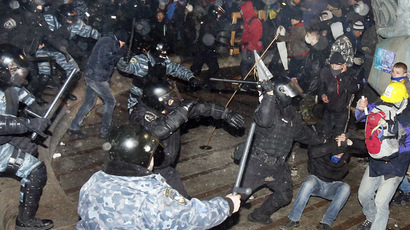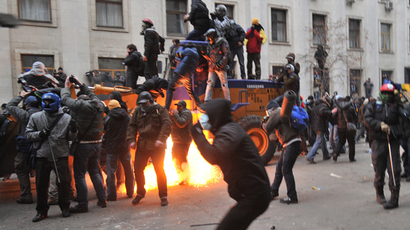Provocateurs’ protest: Radicals 'hijacking' Ukrainian demonstrations
The protest in Ukraine has turned from a jubilant pro-EU youth action to an angry violence-sprinkled stand-off after last weekend’s clashes. Radical nationalist activists are among those likely to score most points in the confrontation.
A week of mostly peaceful protest descended into a brutal dispersal of a protest camp on Friday night and the consequent attacks on police and governmental buildings on Saturday and Sunday. The slogans, which initially called on President Yanukovich to reconsider his delay in European integration, were replaced by those calling for the government resignation.
The escalation of violence invigorated the Ukrainian protest, which was losing pace by the time of the camp eviction. The response in a protest against police brutality was the most massive in years.
It also proved to be quite bloody. According to latest figures, a total of 412 people, including 220 security officers, were injured over the days of the protest.
Protest radicalized
On the top of the anti-government violence were Ukraine’s radical nationalists. Once a marginal political force, they say a surge in popularity in the last years. The nationalist Svoboda (Freedom) party currently has a faction in the Ukrainian parliament and is an active player in the ongoing blockade of the legislature by opposition MPs.
Radical nationalists also play an active part in the streets. Ukraine’s Interior Ministry said activists of the nationalist organization Bratstvo (Brotherhood) were involved in Sunday’s assault on a security cordon near the presidential administration in Kiev, which involved a grader pushing with its blade against the police line.
While the ministry said that leader of Bratstvo, Dmitry Korchinsky, was coordinating the offensive, his name is not among the nine of people arrested this week over the Sunday violence. The activist himself denied any role in the scuffles.
“In fact Bratstvo does not ever take part in any action, any provocations. We are overall oriented on literary work rather than street work,” claimed Korchinsky.
The denial is somewhat disingenuous. In a 2003, interview the Bratstvo head said he has a natural gift for destruction and “feels at home at war.” It’s no surprise that he welcomed the eviction of the protest camp, which made President Yanukovich from a ‘loathed’ figure into a ‘hated’ one.
“If the opposition fails to organize an uprising, there are other people, who will do it. I will be doing it too, because no Ukrainian can be outside of this process,” he pledged.
The fighting moods are evident among some protesters.

“We will fight for the European Union until the end - and even if they bring out tanks, we will win. Yanukovich must go! I'm ready to pick up an AK-47 and start shooting,” activist Miroslav Mikityk told RT’s Irina Galushko.
“Up to a thousand people go to Kiev every day - and our motto is ‘together till the end’. Our resistance forces consist of Afghanistan war veterans and former security service officials,” another one, Roman Martsinkiv, said.
Provocations behind violence?
The Ukrainian Prosecutor General’s Office is currently investigating all suspected crimes during the protests, be it police brutality like the beating of detained protesters during the camp crackdown night, or the protester pelting of police with flares and stones. What it is certain about is that the protesters, who stormed governmental buildings, were well trained in street warfare.
“They went to the rally well-prepared; with clubs, metal chains and tear gas. They acted under clear orders from their leaders. They were the ones provoking the fights and instigating the people,” Ukrainian Prosecutor General Viktor Pshonka said.
The provocation card however is played by various opposition leaders as well. They claim that the Ukrainian government employs paid agents, who are called by a derogatory term ‘titushki’, to spark fights and give police a pretext to use force against the protesters.
‘Titushki’ were blamed for the reported attacks on police on Friday night, which were said to have triggered the crackdown, for the attacks on governmental buildings and for virtually any instance of violence, which happened in the last days.
At the same time the lack of any material interest in the protest is a crucial part of the activists’ identities. Stickers saying “I am not here for money” are all over the Kiev mayor’s office, which was taken over by the protesters and turned into their headquarters.
As the confrontation continues, provocation concerns loom over Ukrainian protest. The latest alarm was raised on Thursday by the Svoboda party MP Oleg Osukhovsky, who claimed that security officers dressed as civilians are planning to start fights at one of the protester camps. This would trigger a massive assault on the demonstrators, he said. So far this didn’t happen.

Earlier on Wednesday a similarly alarming, but directly opposite claim was voiced by Vladimir Oleynik, an MP from the ruling Party of Regions. He said the opposition is going to smuggle a corpse into Kiev’s Independence Square and blame the authorities of an activist murder.
A Ukrainian court ordered on Thursday that the protesters leave the buildings they captured. Police pledged that they will not use force to evict the squatters, but demanded that the court order is fulfilled in five days.














